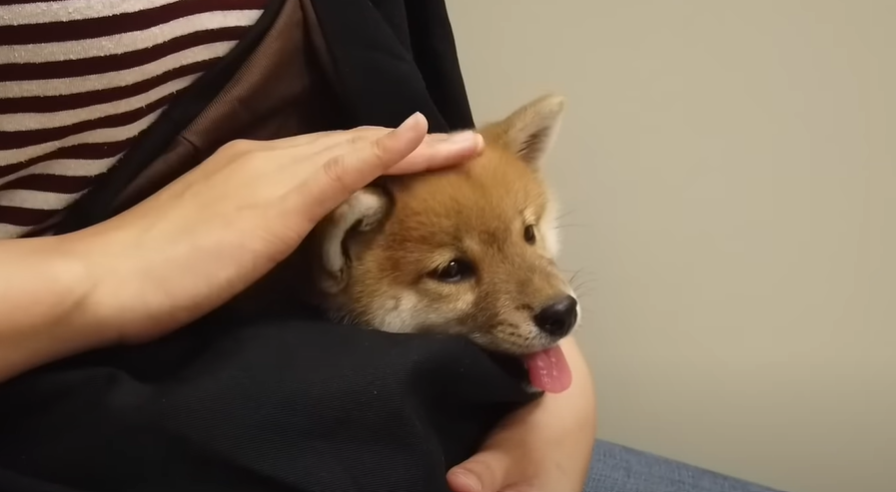There’s a lot of debate going on in the pet industry about the relationship between dogs and Down syndrome. According to the CDC, this condition occurs in people who have an extra chromosome in their genes. Also called Trisomy 21, it can alter a child’s brain development and lead to physical or mental challenges.
But can your dog have Down syndrome? In this blog, we’ll discuss Down syndrome in dogs, ways to check for symptoms, and more.
Can Dogs Have Down Syndrome?
According to PetCareRx, dogs cannot have Down syndrome like humans. That’s because they don’t have the same number of chromosomes or genetic flaws. For instance, dogs have 39 pairs of chromosomes, as compared to 23 in humans. That means you have a total of 46 chromosomes, whereas your dog has 78.
However, they might develop health conditions that mimic Trisomy 21. Even then, this is debated by many researchers and vets.
Many believe that the limited genetic variation testing in veterinary care has led to such uncertainties. For instance, researchers have only discovered 300 genetic diseases in dogs. However, there are thousands of hereditary conditions discovered in humans.

That means if you see a dog with Down syndrome, then there’s a possibility that they suffer from genetic abnormalities that mimic this condition. Examples include physical deformities, developmental delays, etc. Any inherited chromosomal abnormality in a dog will lead to congenital diseases without cure.
How to Check for Down Syndrome Symptoms in Your Dog?
The dog’s physical appearance will play a huge role in determining whether they have symptoms that mimic Down syndrome or not.
For example, they might have a dwarf-like appearance with deformed features. It happens due to poor muscle development and stunted growth. Similarly, the dog might have a low IQ, making it hard to train them.
Other conditions that mimic Down syndrome include the following:

#1. Unusual Face
A dog with Down syndrome-like symptoms will have a short neck, a small head, and a flat face. They also have oddly shaped ears and an upward-slanting eye. Unlike other dogs, they’ll have dry noses.
#2. Unusual Body
Some dogs might also have dry skin patches all over their bodies and experience an abnormal amount of shedding. Deformed and short legs are also signs of congenital disorders in a dog.
#3. Breathing Problems
Puppies who mimic Down syndrome can develop breathing issues due to stenotic nares and laryngeal failure. They will also have difficulty breathing due to constricted nostrils and lung tumors. The common types of breathing abnormalities include panting, dyspnea, and tachypnea.
#4. Bad Eyesight
Usually, dogs with hereditary issues mimicking Down syndrome might have poor eyesight and vision loss. They might also develop cataracts, leading to cloudy eyes due to developmental delays. All these symptoms can occur within the first few years of a puppy’s life.

#5. Hearing Impairment
Deafness in dogs is a genetic impairment that mimics certain Down syndrome symptoms. It usually occurs due to cochlea degeneration and ear infections. Dogs are sometimes born deaf, making it hard for them to obey commands.
Possible Genetic Abnormalities in Your Dog
Even though dogs don’t have Down syndrome, certain congenital diseases mimic this condition. Your dog will display signs of genetic abnormalities at a young age while they’re growing.
Once you take them to the vet, they’ll be diagnosed with either of the following:
Pituitary Dwarfism
This condition stops the pituitary gland from producing thyroid-stimulating hormones. It usually affects young German Shepherds, leading to stunted growth, shorter life spans, and a bad-quality coat.

Congenital Hydrocephalus
This condition causes the dog to develop an abnormally large, dome-shaped skull. It can also cause strabismus, leading to spinal fluid build-up in their brains. Some dogs with congenital hydrocephalus can have mild symptoms, while others can have seizures, blindness, and abnormal movement.
Congenital Hypothyroidism
If your dog has this condition, they’ll have dwarfism and some mental development challenges. It happens because the thyroid gland is unable to release enough hormones.
Portosystemic Shunt
This condition causes an abnormal connection between the dog’s blood vessels and liver. Therefore, high levels of proteins, nutrients, and toxins can end up in their circulating blood. When that happens, the dog might develop behavioral abnormalities, stunted growth, seizures, and gastric problems. The vet will usually stabilize them using medications or corrective surgery to extend their lifespan.
Congenital Cardiovascular Disease
Your puppy might have a genetic condition that affects the quality of their heart. Hence, they’ll have difficulty exercising and suffer from developmental delays. Even then, the exact symptoms will depend on the dog’s breed and genetics.
Taking Care of a Down Syndrome Dog
Like humans, dogs with symptoms similar to Down syndrome need medical intervention. Therefore, you should take your puppy to a vet if you see poor growth rates, vision problems, skin issues, short limbs, muscle weakness, mental development delays, etc.

All these are signs of congenital abnormalities in your little furball. Sometimes, these can be caused by underlying health conditions like poor heart health or issues with brain development. In that case, the vet might recommend medication and surgery to improve their quality of life.
Unfortunately, there are no home remedies that could treat developmental or genetic abnormalities in a dog. But you can still try to support them with a good-quality diet prescribed by the vet. For example, you can feed them a raw, protein-rich diet with supplements and antioxidants for their gut.
Helping them with appropriate exercise could also ease their condition. You can take them out for a walk every day to help alleviate their emotional state. Similarly, creating a safe environment can also help. Examples include installing a stair gate so that they don’t fall off and keeping obstacles away from their path.
In conclusion, dogs don’t have Down syndrome. But they can develop symptoms that sometimes mimic those of a human with that condition. If you see any of the signs mentioned in the blog, you must take them to a vet for a diagnosis. Doing so will help you start early treatment and help them live a normal life.
